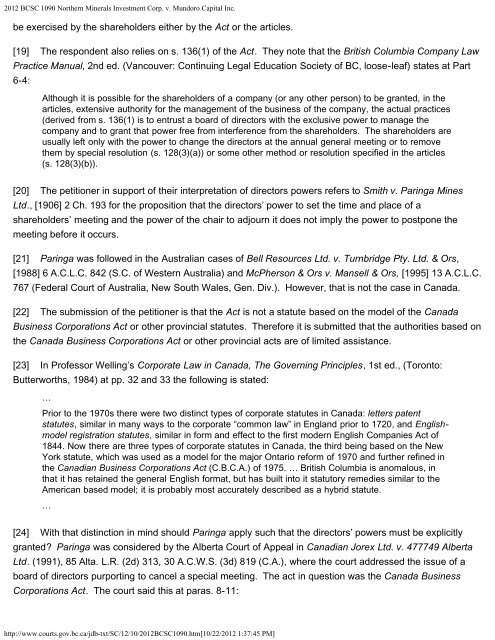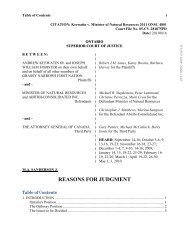2012 BCSC 1090 Northern Minerals Investment Corp. v. Mundoro ...
2012 BCSC 1090 Northern Minerals Investment Corp. v. Mundoro ...
2012 BCSC 1090 Northern Minerals Investment Corp. v. Mundoro ...
- No tags were found...
Create successful ePaper yourself
Turn your PDF publications into a flip-book with our unique Google optimized e-Paper software.
<strong>2012</strong> <strong>BCSC</strong> <strong>1090</strong> <strong>Northern</strong> <strong>Minerals</strong> <strong>Investment</strong> <strong>Corp</strong>. v. <strong>Mundoro</strong> Capital Inc.<br />
be exercised by the shareholders either by the Act or the articles.<br />
[19] The respondent also relies on s. 136(1) of the Act. They note that the British Columbia Company Law<br />
Practice Manual, 2nd ed. (Vancouver: Continuing Legal Education Society of BC, loose-leaf) states at Part<br />
6-4:<br />
Although it is possible for the shareholders of a company (or any other person) to be granted, in the<br />
articles, extensive authority for the management of the business of the company, the actual practices<br />
(derived from s. 136(1) is to entrust a board of directors with the exclusive power to manage the<br />
company and to grant that power free from interference from the shareholders. The shareholders are<br />
usually left only with the power to change the directors at the annual general meeting or to remove<br />
them by special resolution (s. 128(3)(a)) or some other method or resolution specified in the articles<br />
(s. 128(3)(b)).<br />
[20] The petitioner in support of their interpretation of directors powers refers to Smith v. Paringa Mines<br />
Ltd., [1906] 2 Ch. 193 for the proposition that the directors’ power to set the time and place of a<br />
shareholders’ meeting and the power of the chair to adjourn it does not imply the power to postpone the<br />
meeting before it occurs.<br />
[21] Paringa was followed in the Australian cases of Bell Resources Ltd. v. Turnbridge Pty. Ltd. & Ors,<br />
[1988] 6 A.C.L.C. 842 (S.C. of Western Australia) and McPherson & Ors v. Mansell & Ors, [1995] 13 A.C.L.C.<br />
767 (Federal Court of Australia, New South Wales, Gen. Div.). However, that is not the case in Canada.<br />
[22] The submission of the petitioner is that the Act is not a statute based on the model of the Canada<br />
Business <strong>Corp</strong>orations Act or other provincial statutes. Therefore it is submitted that the authorities based on<br />
the Canada Business <strong>Corp</strong>orations Act or other provincial acts are of limited assistance.<br />
[23] In Professor Welling’s <strong>Corp</strong>orate Law in Canada, The Governing Principles, 1st ed., (Toronto:<br />
Butterworths, 1984) at pp. 32 and 33 the following is stated:<br />
…<br />
Prior to the 1970s there were two distinct types of corporate statutes in Canada: letters patent<br />
statutes, similar in many ways to the corporate “common law” in England prior to 1720, and Englishmodel<br />
registration statutes, similar in form and effect to the first modern English Companies Act of<br />
1844. Now there are three types of corporate statutes in Canada, the third being based on the New<br />
York statute, which was used as a model for the major Ontario reform of 1970 and further refined in<br />
the Canadian Business <strong>Corp</strong>orations Act (C.B.C.A.) of 1975. … British Columbia is anomalous, in<br />
that it has retained the general English format, but has built into it statutory remedies similar to the<br />
American based model; it is probably most accurately described as a hybrid statute.<br />
…<br />
[24] With that distinction in mind should Paringa apply such that the directors’ powers must be explicitly<br />
granted Paringa was considered by the Alberta Court of Appeal in Canadian Jorex Ltd. v. 477749 Alberta<br />
Ltd. (1991), 85 Alta. L.R. (2d) 313, 30 A.C.W.S. (3d) 819 (C.A.), where the court addressed the issue of a<br />
board of directors purporting to cancel a special meeting. The act in question was the Canada Business<br />
<strong>Corp</strong>orations Act. The court said this at paras. 8-11:<br />
http://www.courts.gov.bc.ca/jdb-txt/SC/12/10/<strong>2012</strong><strong>BCSC</strong><strong>1090</strong>.htm[10/22/<strong>2012</strong> 1:37:45 PM]
















